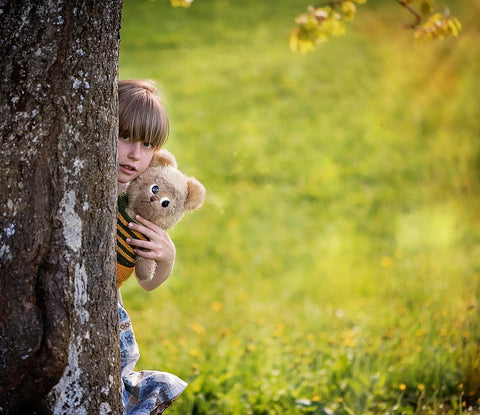“How was the party?” I asked, ready to hear Tales of Wonder and Excitement (not to mention sugar) from my then eight-year-old son, Jaxon.
“It was all right.” Jax dropped his goody bag down on the kitchen counter and turned for his room. “I probably can't eat any of that,” he said matter-of-factly over his shoulder.
“Wait, wait.” Jax stopped and listened obediently for whatever I was about to say, but his eyes looked...so sad. I had never seen him look quite like that. “Did...did you have fun?” I asked lamely.
Jax shrugged.
“Well, you must have done something at the party,” I encouraged. “Did you play any games?”
“They did something with donuts,” he said. “You had to try to grab them with your mouth or whatever. I couldn't do it. Gluten.”
Oh, so that was it. And honestly, how hadn't I known this would eventually happen? The awareness. The “I'm different” realization.
I'd sent Jax with his usual little package of gluten-free “treats,” using recipes that were always a work in progress to get them to taste like “real” food (as Jax was beginning, worryingly, to say). And I'd expected it to be enough. It had been, when he was little.
But now something else had very obviously entered the picture.
Jaxon was finally realizing he was different. And that was hard to swallow.

Special Kids, Special Needs
Naturally, every kid is special. But when additional concerns enter the picture – such as a developmental disability, environmental or food allergy, neuro condition, or physical issue – kids can feel isolated, and misunderstood.
I'll level with you: I learned this more by talking with other moms than I ever did on the internet, in books, or even through my children's pediatrician. The reason? Words are one thing. When you're living the life, it's real. When it's your child, the rubber has hit the road...and you, Mom, Dad or caregiver, need to do something about it.
Perhaps you're a parent just like me, and like so many other families out there who have additional concerns, or potentially dangerous issues, such as, in our case, Celiac disease, an autoimmune reaction to certain proteins (particularly gluten) which can result over time in damage to the gut.
It's serious stuff, but let's face it: ANY child who is treated “differently” due to a similar concern is experiencing something serious...and eventually, she's going to know. It will go beyond “I can't eat that” sassily and naturally stated on the playground to “Why am I different?” at some point.
I believe it does for all of us families with children of additional needs or concerns.
What then?
There's Hope
There are things you can do for, and say to, your child which go beyond the pat and rarely listened-to “you should be grateful...” that we were (pardon me) fed by our parents. (There's room for that too, but you need to make it realistic...we'll get to that in a moment.)
I'm not a child development expert, so do ask your pediatrician before making dramatic changes to your child's lifestyle, and if you are concerned about possible psychological ramifications of her experience with her needs, please consult a professional.
Please note: your child is not my child. She has her own personality, and her own set of actions or comments that will resonate with her. Be sensitive to your child's uniqueness and gear the following to what you feel will work best for her, and for your whole family.
So...let's get down to it, shall we? Let's make things better for our children...one party or playdate at a time.
Arrive Prepared
There are so many appropriate opportunities to teach your child not to treat herself as “different” from anyone else; to have her “learn to deal” with her differences with grace and a pert shrug of her shoulders. They probably come up frequently. And they're wonderful learning times.
In my opinion, at a party trying to make new friends at the park isn't necessarily one of those times.
Oh, it's certain that depending upon your child's needs, the subject could come up among his new friends. And she may be happy to answer questions. And that's fine. But overall, when it comes to a just-for-fun activity, make things as easy as possible for your child to get right into the middle of the fun.
For my family, that means packing tons of goodies Jax can eat and drink. For the next parent, it could mean having an inhaler or Epipen readily available, bringing a lightweight sling seat for maximum mobility, scouting out a quiet cool-down place at the locale ahead of time or some other resource (or resources).
You may be used to lugging around tons of equipment already. If you are, you're probably rolling your eyes at this suggestion. Again, the point here is to make this preparation as EASY AND UNOBTRUSIVE as possible. Don't call your child out (“Are you suuuuuuure you don't want some gluten-free muffins?” “Sammy, are you in the Blue Zone?”) or make him stand out, but do be ready with your easiest possible, least disruptive hacks for his abilities.
Then let him get right into the fun.
Host Party of Your Own
Your child is probably used to going to parties where she has to make accommodations in order to be able to participate.
Here's a novel idea: why not host a party that already has accommodations?
We had an entirely GF party for Jax on his last birthday, and nobody knew, except those Jax happened to mention the fact to. The treats were delicious and everyone played around and had a ball. (Jax has a summer birthday so there was lots of water activity and a water bouncy house.)
Your child deals constantly with his own limitations, whatever those are. This one time, let accommodations already be there so he can feel truly (I hate this word – but I guarantee you it WILL come up at some point) “normal.”
Here's a perk: if your child does want to talk about the different things you've done to craft “his” party, he has the opportunity to. He can teach his friends in this way about something new and open up new worlds of understanding for them as well.
Let's be clear. The point here isn't to create some fantasyland for your child where he's “just the same!” as everyone else or to hang out in a state of denial. It's to put control into your child's hands (he decides what he does and doesn't do at his party, without limitations; he decides whether or not to reveal intimate details to friends, rather than having this forced on him by circumstances).
It's to show your child he can be in control, and that he can steer his own ship. He actually may have fewer limitations than he thinks he has if he can achieve this mindset. In my opinion, this is very valuable indeed.
It's a win-win.
Talk About It
We have had the “everyone has his/her things to deal with” conversation many times. Even in non-special needs families, this talk will generally come up.
Why? Not because it's a tortuous rite of passage every parent inflicts on her child (“You should be GRATEFUL, darn it!”) but because, well, it's true.
Children enter the world with very black-and-white thinking. They'll use superlatives quite a bit. (“Everybody gets to do this, I never get to do X, this is the worst day of my life.”) That's natural; it's because kids are learning about and trying to interpret their world, and that means putting things, at least for now, into clear categories. Good. Bad. Fun. Sucks. Delicious. Gross. You get the idea.
And a child with different needs from the general population – at least as far as she can tell – may occasionally feel the entire world is having a gas, while she's stuck on the sidelines.
I say, try a new take on the “you should be grateful” speech. Don't finger-wag and don't shame. Instead, introduce the idea in an upbeat way. Talk about people with different circumstances and abilities and all the things they can do (don't go overboard, just talk about everyday, achievable goals; again, you're not trying to make a “shame on you for not achieving” picture here).
Jax discovered he was autistic at around age seven. Oh, he'd heard the word before, but he REALLY realized that it meant something at around that time. He came to me with sad eyes and asked “why” he was autistic. Within a few years I heard for the first time, “I hate autism!”
I didn't wax surrealistic (and possibly inaccurate) by making wild claims that Albert Einstein was autistic and so is Bill Gates. Instead, I began, slowly, to introduce different very real (real in our immediate experience) people. An uncle. Dad. Me. Jax's friend Millie.
Bit by bit I gently let it sink in to Jax's head that nobody has “a normal life.” Nobody. There probably isn't any such thing, given trend changes in what's considered “normal” and not anyway, as well as individual interpretation. But leaving philosophy aside, letting your child know he is not the only person struggling with someone (indeed, I don't believe anybody is immune to struggle) makes her feel less persecuted and more like a functioning and needed part of the human race – her rightful place no matter what her challenges are.
When Your Child is Snubbed
All of these suggestions won't be sunshine and rainbows. Your child may lose a friendship (actually, everyone does at various points while growing up), or may be snubbed on the playground. She may even be bullied. And yes, once in a while, it could specifically (and very vocally) be “because of” her “differentness.”
My take on this is: if it's a snubbing, treat it as you would with any child. Ask your child to have as calm a possible talk with the friend to see if she can help the friend understand circumstances better.
After that, if the snubbing continues, it's time for the tried and actually quite true “If that person doesn't love you, find someone who does.” She won't believe it at first, and she will hurt, and she will cry. You'll be there to hold her. And just as your mother probably did for you, you will help her to eventually really believe those words. If your child was directly snubbed due to her disability, there will be a lot more to talk about, but don't glaze over this part. Do address that there is such a thing as prejudice against the differently-abled, but stress that this is changing for the better, and that she, by being her beautiful self, is helping to create that change. Let her know she IS making a difference, and she IS needed...and she IS valuable, just for being herself.
Actively help your child make new friends if she's very young, or encourage from the sidelines as quietly as possible for an older child, such as suggesting that your daughter invite a new friend to a sleepover.
If it's bullying, however, do not let it go. Please stand up and be the one to say something. A child who bullies your child is almost undoubtedly bullying other children. There could be a variety of reasons, but there is never an excuse for bullying. Full stop. Speak to the parents or, if it happens on school property, to the school. Your child needs to see that bullying will never fly. Ever.
Don't Just Have Special Needs Friends
One thing we've learned is to not just have friends “who can understand” Jax's issues. Rather, we have kept his friends pool broad and without limitations. He has some friends who are autistic, sure. And he has one gluten-free buddy. But for the most part we put no limits in this way.
It's tempting to surround yourself with people you “don't have to explain things to” (trust me, I know). But in my experience, that can make anyone, but especially a young child, see his/her disability first; it makes the disability the focus. And it shouldn't be. Your child's heart, her love of singing or dancing, her quirky sense of humor, her affection SpongeBob, climbing trees or collecting worms, or whatever makes her, her, should be the focus.
I don't believe there's any such thing as too many friends, if they're true friends who really love you. So come one, come all – and let your child know she can be loved by anyone...and is.
Your Home. Your Life. All Organic.

